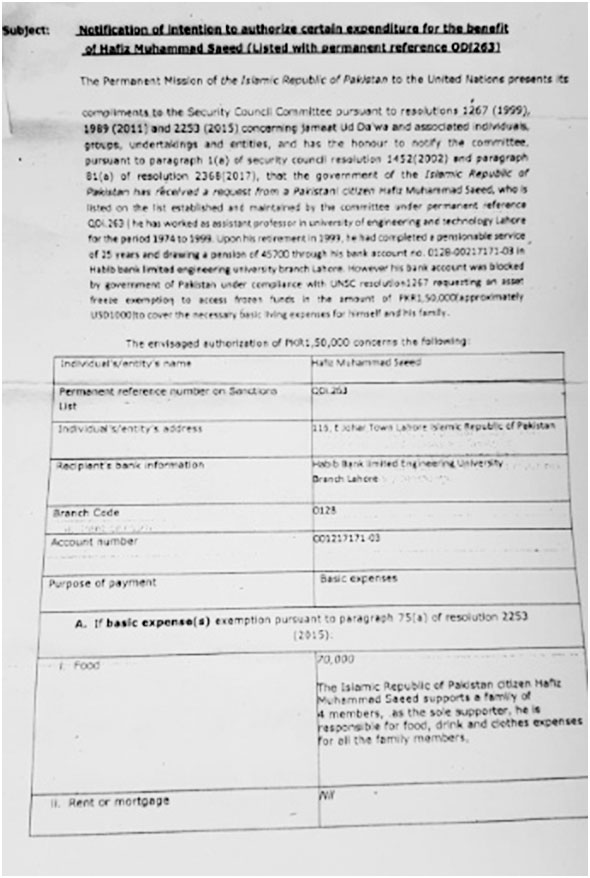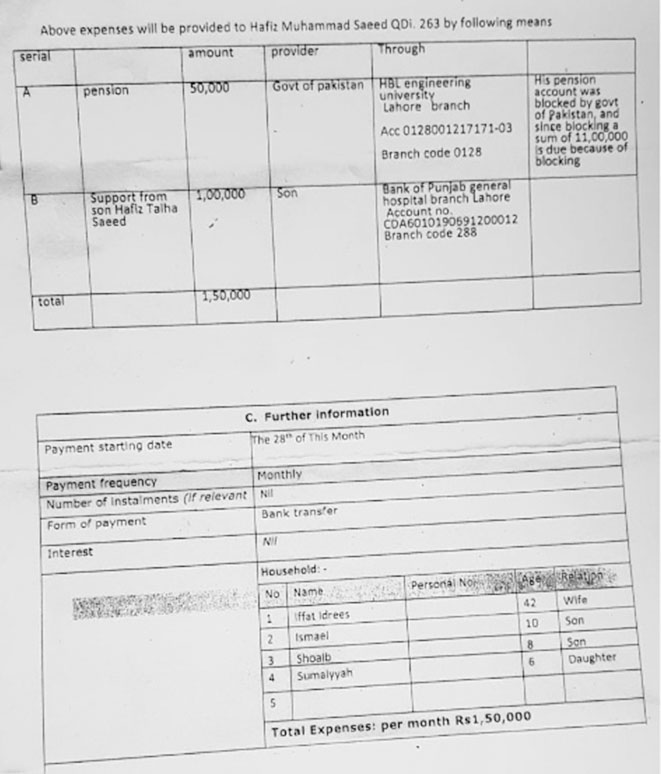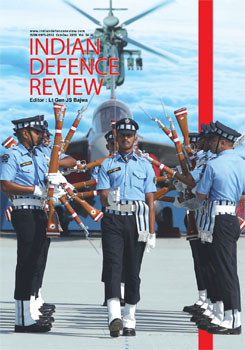
In October 2019, the Asia Pacific Group (APG) published the Mutual Evaluation Report (MER) of Pakistan which is an assessment of Pakistan’s anti-money laundering and counter terrorism financing measures.1 The MER contained some scathing remarks on Pakistan’s superficial action to curb terrorism financing and money laundering. APG in its report has stated, “Pakistan has not taken sufficient measures to fully implement UNSCR 1267 obligations against all listed individuals and entities – especially those associated with Lashkar-e-Toiba (LeT)/Jamaat-ud-Dawa (JuD), and Falah-i-Insaniat Foundation (FIF) as well as the group’ leader Hafiz Saeed” (Sic).
Groups such as the Lashkar-e-Toiba and its charity fronts have managed to function freely in Pakistan despite being sanctioned under United Nations Security Council Resolutions (UNSCR) 1267 and 1373. While under UNSCR 1267 (1999), all members states are obligated to enforce assets freeze, travel ban and arms embargo, the member states are obligated to combat terrorism under UNSCR 1373 (2001). More importantly, one of the primary obligations under both these UNSCRs especially under 1267 is the asset freeze which consists of freezing bank accounts and seizing properties linked to terrorist groups and entities. Pakistan’s performance under both these UNSCRs has been dismal.
As far as the asset freeze is concerned, Pakistan has seized 190 properties in Punjab linked to UN listed entities including 82 madrassas, 70 hospitals or dispensaries, 25 educational institutions and 13 office centres. Pakistan has also seized properties in Khyber Pakthunwa, Peshawar, Haripur, Manshera, Abbotabad and Dera Ismail Khan. However, Pakistan has not provided any data about which terrorist group these assets were seized from. Referring to this, the APG report states, “Comprehensive details on when these actions took place (the assessment team assumes most actions occurred following the February 2018 Anti-Terrorism (Amendment) Ordinance), which province actions were taken in and which terrorist groups the assets were associated with was not provided.”
As far as the bank account freeze is concerned, Pakistan has frozen only 36 bank accounts since 2013, with a total value of $69,492. Pakistan has frozen bank accounts of Jamat Ahle Sunnat in 2017, JUD, Taliban, Al Furqan Foundation in 2015, Taliban in 2014 and FIF, Ahmed Shah Noorzai in 2013. Similarly, Pakistan froze 4,770 bank accounts with a total value of $320,074 under UNSCR 1373. However, the APG report added that Pakistan has been withdrawing the freeze on frozen bank accounts, “Furthermore, the assessment team understands that proscribed individuals are regularly de-listed and their accounts unfrozen. Pakistan did not provide any information on the value of unfreezing actions or what measures were put in place to ensure that these unfrozen funds were not made available for terrorist purposes once removed.”
The China Factor
This report was followed a very important FATF plenary session headed by China which was held in Paris from 13 to 18 October 2019. Despite the widespread belief that Pakistan may be potentially blacklisted for inaction against terror groups such as Lashkar-e-Toiba, Jaish-e-Mohammed, this FATF plenary session decided to retain Pakistan on the grey list. Blacklisting Pakistan would have had serious implications for not only Pakistan’s weakened economy, but also for others such as China that has invested heavily in Pakistan as a blacklist would lead to embargo and sanctions.
Interestingly, despite being deliberately oblivious to the impending threat of blacklisting, Pakistan still recommended measures which appear to facilitate reintegration of terrorist groups such as the Lashkar-e-Toiba into Pakistan’s financial mainstream. In August 2019, the United Nations Security Council committee pursuant to resolutions 1267 (1999), 1989 (2011) and 2253 (2015) approved a request from the Government of Pakistan to defreeze bank accounts of three individuals – Hafiz Mohammed Saeed, Haji Mohammed Ashraf and Zafar Iqbal of Lashkar-e-Toiba. While Hafiz Mohammed Saeed is the founder of Lashkar-e-Toiba, the other two are its key operatives, all of whom have been implicated in various terror incidents in India, with the most notable one being the 26/11 Mumbai attacks in 2008. Concomitantly, Pakistan High Court also accepted an appeal from Hafiz Mohammed Saeed challenging his detention under terrorism financing provisions.
When the entire global community is watching Pakistan’s efforts to curb terrorism closely post the Balakote strikes, why would Pakistan risk being seen supporting groups such as Lashkar-e-Toiba? These contrarian actions of the Pakistani establishment, proves to be a paradox for even the most erudite. This leads us to the question – given the imminent threat of FATF blacklisting, what would have driven Pakistan to do a volte face from its earlier decision to act against terrorist groups even though it was farcical? Did other interests of Pakistan outweigh FATF blacklisting or did Pakistan take a gamble to send a message to the stakeholders such as China, which eventually postponed FATF blacklisting again till February 2020.
For example, the Chinese net Foreign Direct Investment (FDI) flow has been $1.8 billion for 2017-2018, up from $1.2 billion in 2016-2017. Similarly, out of the 55 companies which have been newly incorporated in Pakistan in 2017-2018, the Chinese have incorporated around 38 percent or 21 companies taking their total tally to 145 as on 30 June 2018. With this kind of investment outlay in Pakistan, it would not augur well for the Chinese if Pakistan makes the transition into the blacklist. Given the above, Pakistan may have taken a calculated gamble at a time when Xiangmin Liu from China assumed the position of President of the FATF on July 01, 2019. This would have presented Pakistan with an opportunity to evade sanctions as well as mainstream Lashkar-e-Toiba financially which it had attempted earlier as well.
Mainstreaming Hafiz Mohammed Saeed
In March 2019, one month after the Balakote strikes, the UN rejected Hafiz Mohammed Saeed’s request to remove his name from the sanctions list under USNCR 1267. The ban on the co-founder of Lashkar-e-Toiba was upheld by the UN subsequent to the report by an independent Ombudsman Daniel Kipfer Fasciati, appointed by the UN. The assessment factored into account “highly confidential information” provided by the Indian government which objected to the removal of the ban. At the same time, Pakistani government under Prime Minister Imran Khan did not oppose the appeal, indicating a tacit understanding with the Lashkar-e-Toiba.
This was followed by Pakistan’s appeal to the UN Sanctions Committee to defreeze bank accounts of Hafiz Mohammed Saeed for meeting his living expenses. On August 15, 2019, the UN Sanctions committee came out with a letter granting Hafiz Mohammed Saeed access to his bank accounts for meeting his monthly family expenses.2 The UN in its letter has stated that this was approved based on recommendation by the Pakistani government. As per that request, Hafiz Mohammed Saeed’s expenses amount to Pakistan Rupee (PKR) 150,000 per month expended towards living expenses, health and children’s education. These expenses are supported by two income streams – one is PKR 50,000 as pension from the Government of Pakistan and the other PKR 100,000 contribution from his son Hafiz Talha Saeed. While the pension proceeds from Government of Pakistan will be credited to the designated bank account no 0128001217171-03 held with Habib Bank Limited, HBL Engineering University, Lahore Branch, Talha Saeed’s contribution will be credited to account no CDA6010190691200012 held with the Bank of Punjab, Hospital Branch, Lahore (See Image 1).3 Along with Hafiz Mohammed Saeed (QDi 263)4, two more individuals – Haji Mohammed Ashraf (QDi 265) and Zafar Iqbal (QDi 308) who are the key accused in the Mumbai attacks have also been provided access to their bank accounts. No country, including India, has objected to this appeal.

Concomitantly, a two-member bench of the Lahore High Court issued notices to the Punjab Government in an appeal lodged by Hafiz Mohammed Saeed to quash 23 FIRs filed by the Counter Terrorism Department (CTD) of Punjab Police against Hafiz Mohammed Saeed for collecting funds using charity fronts such as the Al-Anfaal Trust, Dawatul Irshad Trust and Muaz Bin Jabal Trust. The above actions possibly, indicate that Pakistan may be attempting to delink Hafiz Mohammed Saeed as an individual from Lashkar-e-Toiba or even may be gradually attempting to mainstream Hafiz Mohammed Saeed and bring him out of the sanctions ambit. One can even witness a birth of a new entity under the stewardship of Hafiz Mohammed Saeed in the near future.
Though the amount which will be paid to Hafiz Mohammed Saeed is meager, one has to try to understand as to why Pakistan would risk requesting relaxation at this time despite the Financial Action Task Force blacklisting being round the corner. There may be two reasons which would have driven Pakistan to support the defreezing of Hafiz Mohammed Saeed’s bank accounts.

Lashkar-e-Toiba – Pakistan’s Strategic Asset
Pakistan may be attempting to use Lashkar-e-Toiba again, as a strategic asset not only in India, but also in Afghanistan. Firstly, Pakistan seeking relaxation only for key Lashkar-e-Toiba leaders may possibly indicate that Pakistan may have decided to unleash Lashkar-e-Toiba against Indian interests at home, and elsewhere including in Afghanistan. The last known attack perpetrated by Lashkar-e-Toiba outside Jammu and Kashmir, was the 2008 Mumbai attacks. After that, there has been a relative lull in terror attacks across India with exceptions of bomb blasts carried out by another Lashkar progeny, the Indian Mujahideen. By propping up Lashkar-e-Toiba again, Pakistan may be taking a gamble by anticipating an aggressive military reaction from India in the wake of any terror attacks on Indian interests. Any aggressive military reaction from India would provide Pakistan with sufficient manoeuvering space for international diplomacy and justify its disproportionate military reaction.
Secondly, Pakistan which is supporting the Taliban is looking at a key role for Lashkar-e-Toiba in Afghanistan. The peace process in Afghanistan at present may favour the Taliban. However, some reports indicate that there is widespread discontent in the ranks of the hardcore Taliban which has resulted in defections to the Islamic State in Khorasan Province (ISKP). Given these recent defections of some Taliban commanders to ISKP, Lashkar-e-Toiba is certain to fill this void to support a weakened Taliban. There are already reports that Lashkar-e-Toiba has a strong presence and has been actively participating in joint operations with the Taliban in Kunar province against the Islamic State in Khorasan Province (ISKP).
In May 2019, a United States Department of Defence report identified the Lashkar-e-Toiba, with an estimated strength of at least 300 cadres, as one of the main threats to its soldiers. There have been reports since 2016, about terrorists belonging to Lashkar-e-Toiba either being killed or captured most specifically in Kunar province. Lashkar-e-Toiba is also believed to have a presence in Nangarhar, Nuristan and Kandahar in Afghanistan. Recently, the Afghan forces arrested an individual named Ibrar from Rodat district, who is one of the top intelligence operatives of the Lashkar-e-Toiba. This indicates the intention to establish organisational infrastructure in Afghanistan.
The above amplifies some of the possible benefits which Pakistan may derive through these defreezing measures. But these measures have exposed Pakistan more than it may have helped it which may be counter-productive for three main reasons stated below.
Is Pakistan Shooting Itself in the Foot?
Firstly, Pakistan has conceded that it has been paying pension for an individual who had been sanctioned in 2008 (UN Sanction Number QDi 263). Pakistan’s request letter states that PKR 11,00,000 in pension payments have been frozen which is due to Hafiz Mohammed Saeed which has accrued in his account since the time of blocking. Given the monthly pension amount as PKR 50,000, PKR 11,00,000 can be roughly apportioned over a period of at least two years which will indicate that the account was blocked from 2016-2017. This indicates that the Pakistan government has been paying pension to Hafiz Mohammed Saeed from 2008 to 2016 in direct contravention of UNSCR 1267 as Hafiz Mohammed Saeed is a sanctioned individual under UNSCR 1267.5
Secondly, the Pakistani request also indicates that PKR 100,000 will be provided by Hafiz Mohammed Saeed’s son Hafiz Talha Saeed who is a US treasury designated and sanctioned individual. Hafiz Talha Saeed was sanctioned in 2012, by the US Treasury. According to the US Treasury department, Hafiz Talha Saeed headed the Lashkar-e-Toiba’s teacher’s wing and supervised its social media operations of LeT. However, it is imperative to state that Hafiz Talha Saeed has not been sanctioned by the UN.
Thirdly, the UN Security Council Committee, in its letter states, “… It is an Intention of Pakistani Authorities to authorise certain expenditures to the benefit of Hafiz Mohammed Saeed.” This indicates that the Pakistan government has initiated this request unlike the earlier one in March 2019, which it claimed originated from the Individual (LeT Chief) directly to UN to delist him. This again proves Pakistan being officially complicit in directly aiding a UN designated terror group. This is probably the first time Pakistan inadvertently has officially conceded that it has been financing a UN designated individual. While Pakistan has officially initiated this proposal, the Indian government’s lack of reaction has flummoxed the security planners.
The Indian Indifference
The UN in its letter has stated that since there was “No Objection” to this relaxation before August 15, 2019, it has been approved which indicates that what ought to be objected to was not done not only by the Indian government, but also the entire global community. While the Indian government has been proactive in objecting the delisting request in March 2019, but not raising any objections for an appeal to provide access to bank accounts requested by Pakistan officially, is paradoxical.
However, the Indian Government can still make amends. To begin with, India may place an objection with the UN, citing the current Mutual Evaluation Report on Pakistan which has reprimanded Pakistan for not taking steps to curb terrorism financing. India could also cite the report by the independent Ombudsman Daniel Kipfer Fasciati, which upheld the ban on Hafiz Mohammed Saeed in March 2019. Simultaneously, it would augur well for the Indian government which may approach the UN to sanction Hafiz Talha Saeed under UNSCR 1267 (1999), 1989 (2011) and 2253 (2015) related to the ISIS, Al-Qaeda and other associated individual and groups. But before such a move, the Indian government can invoke the newly amended Unlawful Activities Prevention Act where in it can proscribe Hafiz Talha Saeed as an individual terrorist, a move which was recently invoked against Hafiz Mohammed Saeed.
Conclusion
Time and again, Pakistan has been able to wriggle out of some precarious situations with respect to its support to terror groups majorly due to Chinese help. It is quite astonishing that Pakistan’s recommendation to the United Nations 1267 committee, to provide bank account access to top leaders of Lashkar-e-Toiba, flies in the face of the international community which has been fighting the war on terror.
It is equally surprising to see the lack of initiative from the Indian government and other stakeholders such as the United States, who have not raised any objections to Pakistan’s request. This could be due to the fact that some perceive the value in question to be meager. However, meager the amount might, this relaxation is a symbolic step for Pakistan and its asset Hafiz Mohammed Saeed, which may lead towards a possible reintegration into the financial mainstream. The actions of Pakistan appear to be a series of well orchestrated and calibrated steps to overtly facilitate reintegration of terror groups such as the Lashkar-e-Toiba. These actions come at a time when the stakeholders such as the Chinese appear to be over leveraged economically in Pakistan. By doing this, Pakistan appears to be upping the ante against India and other stakeholders in Afghanistan.
Pakistan needs groups such as Lashkar-e-Toiba not only to operate against India, but also in Afghanistan where the peace deal with the Taliban has pitted huge stakes for Pakistan. Pakistan also cannot expect any incentive to cut off its links with Hafiz Mohammed Saeed and Lashkar-e-Toiba given the current Indo-Pak tensions. However, one has to wait and see whether Pakistan’s recent recommendations to the UN supporting Hafiz Mohammed Saeed pays off in the long run. However, by doing so, Pakistan has certainly exposed itself and has perhaps fallen on its own sword.
Endnotes
1. Asia Pacific Group (October 2019), Mutual Evaluation Report of Pakistan. APG is a FATF style regional body for Asia Pacific region.
2. Dipanjan Roy Chaudhury, UN allows Hafiz Saeed to use his bank account for ‘basic expenses’, The Economic Times, 27 September, 2019, available at https://economictimes.indiatimes.com/news/international/world-news/unsc-allows-hafiz-saeed-to-withdraw-money-from-his-bank-account-for-basic-expenses/articleshow/71316111.cms?from=mdr (accessed on 23 Oct 2019)
3. Twitter post of Journalist Aditya Raj Kaul dated 25 Sep 2019, @AdityaRajKaul
4. Non state entities are listed using QDI series under UNSCR1267 & UNSCR 1989.
5. Government of Pakistan claims that Hafiz Mohammed Saeed was working as an Assistant Professor in the University of Engineering and Technology, Lahore from 1974 till his retirement in 1999 with a monthly pension of PKR 45,700





